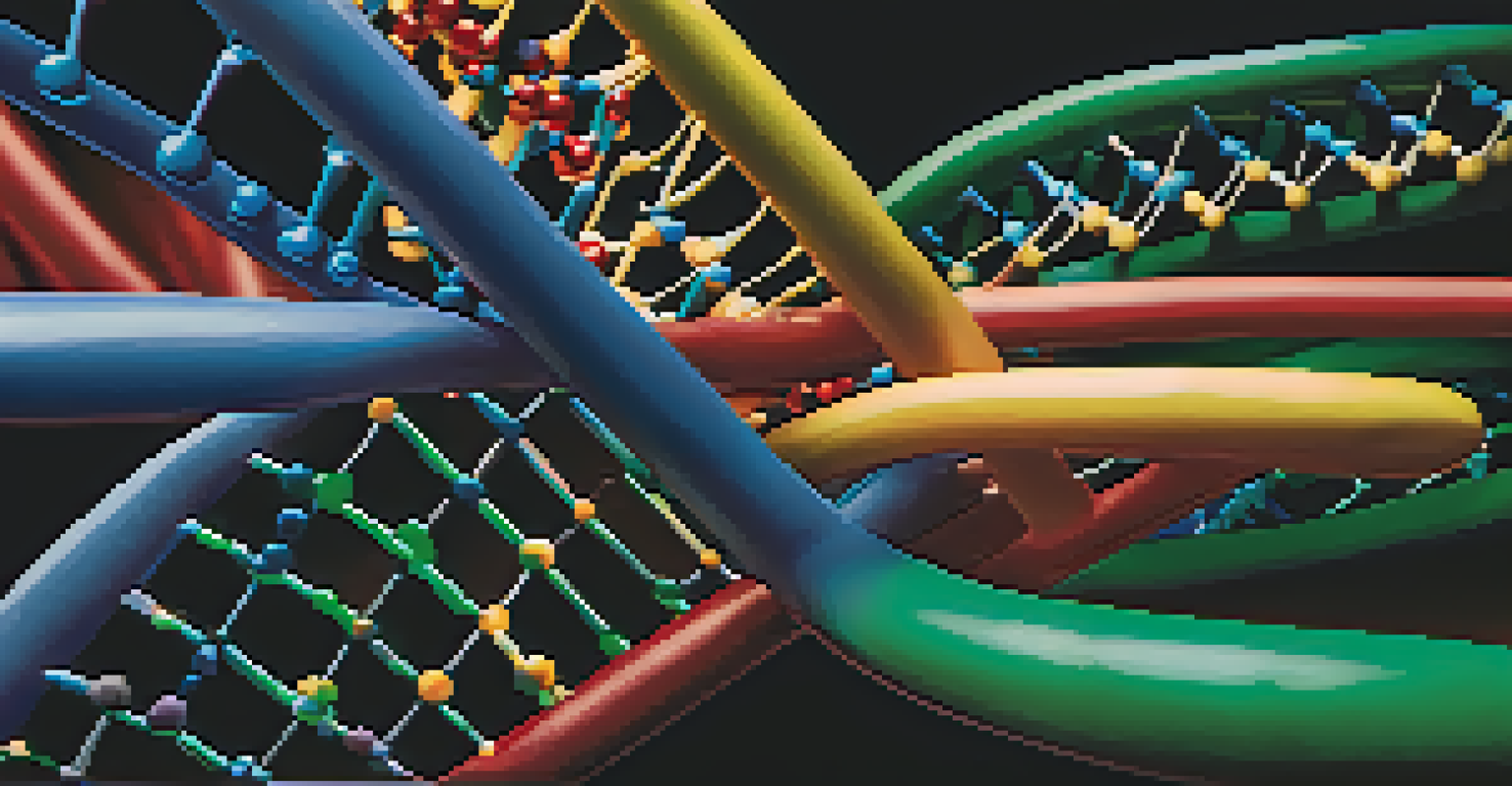Key Genetic Tests: Insights into Diagnosing Genetic Disorders

Understanding Genetic Testing and Its Importance
Genetic testing is a medical test that examines your genes, chromosomes, or proteins. It helps identify genetic disorders, allowing for early diagnosis and treatment. By understanding our genetic makeup, we can uncover vital insights into our health and inheritance patterns.
Genetic testing can provide important information about a person's health and help guide medical decisions.
These tests can provide information about a person's risk of developing certain diseases, guiding preventive measures. For instance, knowing your predisposition to conditions like breast cancer can lead to proactive health strategies. This personalized approach to healthcare is becoming increasingly important in today's medical landscape.
Moreover, genetic testing can help families make informed decisions regarding family planning and medical management. By learning about potential genetic disorders, individuals can seek counseling or consider options that align with their values and health goals.
Types of Genetic Tests: A Closer Look
There are several types of genetic tests, each serving a unique purpose. Diagnostic testing confirms or rules out a known genetic disorder in a person displaying symptoms. In contrast, carrier testing helps identify individuals who carry one copy of a mutated gene that could cause a genetic disorder in their offspring.

Predictive testing assesses the likelihood of developing a genetic disorder in the future, especially for conditions like Huntington's disease. Newborn screening is another critical test that checks for genetic disorders shortly after birth, enabling early intervention and treatment.
Genetic Testing Enables Early Diagnosis
Genetic testing helps identify genetic disorders, allowing for early diagnosis and personalized treatment strategies.
Lastly, prenatal testing can be performed during pregnancy to assess the health of the fetus. These various tests can provide essential information, allowing families to make informed choices about their health and futures.
The Role of Genetic Counseling
Genetic counseling is an essential component of the genetic testing process. It provides individuals and families with information and support regarding genetic disorders and testing options. A genetic counselor can help interpret test results, making them easier to understand and navigate.
The greatest danger in times of turbulence is not the turbulence; it is to act with yesterday's logic.
Counseling sessions often address concerns about the implications of testing, including emotional and ethical considerations. This support enables individuals to make informed decisions about whether to proceed with testing and how to act on the results.
Additionally, genetic counselors can help families understand their risk factors and suggest preventive measures. This holistic approach ensures that individuals feel supported throughout their journey in understanding their genetic health.
Common Genetic Disorders and Their Tests
Several genetic disorders are commonly screened for through genetic testing. Cystic fibrosis, for example, is a severe genetic condition that affects the lungs and digestive system. Carrier testing can identify individuals who carry the mutated gene responsible for this disorder, informing family planning decisions.
Another example is sickle cell disease, a condition where red blood cells become misshapen, leading to various health complications. Genetic tests can identify carriers of the sickle cell trait, which is crucial for understanding potential risks in future children.
Role of Genetic Counseling is Key
Genetic counseling provides essential support and information, helping individuals navigate testing options and understand results.
Additionally, Tay-Sachs disease is a genetic disorder that primarily affects individuals of Ashkenazi Jewish descent. Testing for this disorder can provide critical information for couples considering having children, allowing them to make informed reproductive choices.
The Advancements in Genetic Testing Technology
The field of genetic testing has seen remarkable advancements in recent years. Technologies like next-generation sequencing (NGS) allow for rapid and comprehensive analysis of genetic material. This innovation has made genetic testing more accessible and affordable than ever before.
With these advancements, we can now analyze entire genomes, identifying potential genetic mutations linked to various disorders. This thorough approach provides a more complete picture of an individual's genetic health.
Furthermore, the integration of artificial intelligence (AI) in genetic testing is enhancing the accuracy of results. AI can help interpret complex genetic data, improving diagnosis and helping researchers discover new links between genes and diseases.
Ethical Considerations in Genetic Testing
While genetic testing offers numerous benefits, it also raises ethical questions that must be addressed. Privacy concerns are at the forefront, as individuals may worry about how their genetic information is stored and shared. Ensuring confidentiality is crucial in maintaining trust in the testing process.
Additionally, the potential for genetic discrimination poses a significant concern. Individuals may fear being treated differently by insurers or employers based on their genetic predispositions. Laws like the Genetic Information Nondiscrimination Act (GINA) aim to protect individuals from such discrimination.
Advancements Revolutionize Testing
Recent advancements in technology, such as next-generation sequencing and AI, are making genetic testing more accurate and accessible.
Lastly, informed consent is vital in the genetic testing process. Individuals should fully understand the implications of testing, including potential emotional impacts and the possibility of discovering unforeseen health risks.
The Future of Genetic Testing and Healthcare
The future of genetic testing looks promising, with ongoing research paving the way for new discoveries. As our understanding of genetics deepens, we will likely see the emergence of more targeted therapies and personalized treatment plans. This shift toward precision medicine is transforming the way we approach healthcare.
Moreover, as genetic testing becomes more integrated into routine medical care, we can expect a broader acceptance of its use among healthcare providers. This change will allow for earlier interventions and better management of genetic disorders, ultimately improving patient outcomes.

Finally, public awareness and education about genetic testing will play a crucial role in its future. As more individuals understand the benefits and limitations of genetic testing, they will be better equipped to make informed choices about their health.